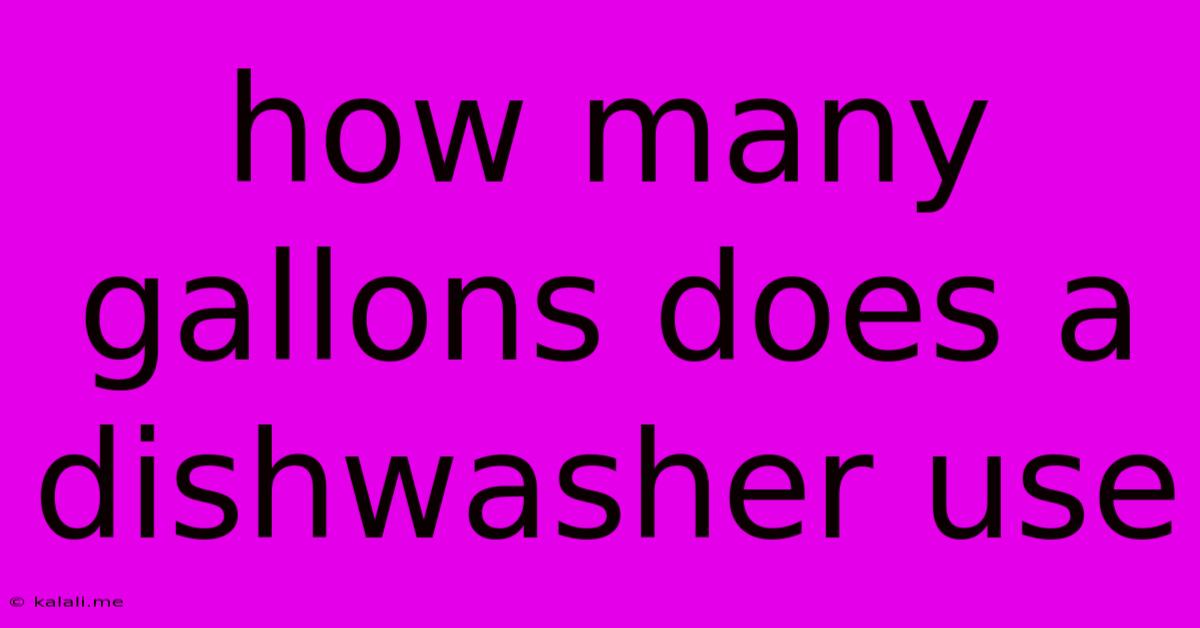How Many Gallons Does A Dishwasher Use
Kalali
May 31, 2025 · 3 min read

Table of Contents
How Many Gallons Does a Dishwasher Use? A Comprehensive Guide to Water Consumption
Are you looking to reduce your water usage at home? Understanding your dishwasher's water consumption is a great place to start. This article explores the average water usage of dishwashers, factors that influence consumption, and tips on saving water.
Dishwashers have become a staple in modern kitchens, offering convenience and efficiency. However, concerns about water conservation are valid. Knowing how much water your dishwasher uses can help you make informed decisions about its usage and potentially upgrade to a more water-efficient model.
Average Water Usage per Cycle
The average dishwasher uses between 3 and 6 gallons of water per cycle. Older models tend to consume more water (closer to the 6-gallon mark), while newer, Energy Star-certified models often use significantly less (closer to 3 gallons or even less). The exact amount depends on several factors, which we'll delve into next.
Factors Affecting Dishwasher Water Usage:
Several factors contribute to the variation in water consumption:
- Dishwasher Model: As mentioned, older models are generally less efficient. Newer models often incorporate advanced technology like variable spray arms and better insulation to minimize water waste. Look for the Energy Star label for models known for water efficiency.
- Wash Cycle: Different wash cycles consume varying amounts of water. A heavy-duty cycle will naturally use more water than a light or eco-friendly cycle. Choosing the appropriate cycle for the level of soiling on your dishes is crucial.
- Water Pressure: Higher water pressure can lead to slightly higher water consumption, although modern dishwashers are designed to regulate water flow regardless of pressure.
- Water Heater Settings: If your water heater is set to a higher temperature, the dishwasher may require more time to reach the desired temperature, potentially leading to slightly increased water usage.
- Load Size: Running a half-full dishwasher will generally use more water per dish compared to a full load. Always aim to run a full load whenever possible.
Tips for Reducing Dishwasher Water Usage:
Here are some practical ways to minimize water consumption:
- Use the correct wash cycle: Select the appropriate cycle based on the level of soil on your dishes. Avoid unnecessarily using the heavy-duty cycle.
- Run full loads: Only run the dishwasher when it's completely full.
- Pre-rinse strategically: While pre-rinsing is often unnecessary, removing large food scraps can help your dishwasher operate more efficiently and use less water.
- Check for leaks: Regularly inspect your dishwasher for any leaks or signs of malfunction that could lead to water wastage.
- Consider a water-efficient model: When replacing your dishwasher, prioritize Energy Star-certified models known for their lower water consumption.
- Air dry your dishes: Air-drying instead of using the heated drying cycle can save a significant amount of energy and indirectly reduce water usage.
Conclusion: Conserving Water with Your Dishwasher
Understanding your dishwasher's water consumption and employing water-saving strategies can significantly reduce your household's environmental impact. By choosing the right wash cycle, running full loads, and potentially upgrading to a more efficient model, you can contribute to water conservation while maintaining clean dishes. Remember to check your dishwasher's manual for specific water usage information and optimal operation guidelines.
Latest Posts
Latest Posts
-
What Is A Positive Divided By A Negative
Jun 01, 2025
-
Can You Install Vinyl Flooring Over Tile
Jun 01, 2025
-
Times That Foster Alludes To Another Book
Jun 01, 2025
-
What Does P And Q Mean
Jun 01, 2025
-
How To Remove Aluminum Foil From Oven
Jun 01, 2025
Related Post
Thank you for visiting our website which covers about How Many Gallons Does A Dishwasher Use . We hope the information provided has been useful to you. Feel free to contact us if you have any questions or need further assistance. See you next time and don't miss to bookmark.